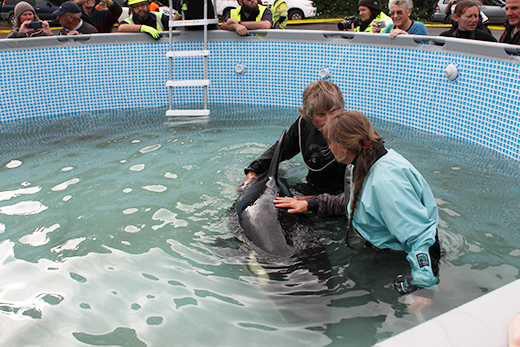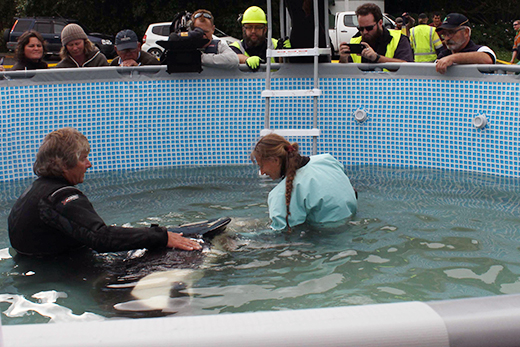Teams of volunteers carried an orca calf ashore on a stretcher and placed him in a pool filled with sea water in an attempt to save his life this afternoon.
Orca Research Trust founder Dr Ingrid Visser says the calf, which has been swimming alone off the Bay of Plenty coastline for a long period of time, is dehydrated and had been struggling against the currents, but can now relax.
Dr Ingrid Visser of the Orca Research Trust and international orca expert Jeff Foster comfort the orca calf in the pool. Photo: Elaine Fisher
Ingrid was in the pool, along with American international orca expert Jeff Foster, to help lower the young mammal into the water as volunteers lifted him onto the back of a ute, then up over the tall sides of the pool.
A small crowd gathered to watch the procedure at a location which is being kept secret, and Ingrid explained quietly to them what would happen next for the calf.
'You can see how his skin is wrinkly which shows he is dehydrated. We will feed him with electrolytes and later fish – when we find out what he likes.”
She and Jeff stroked the calf and scratched his tummy when he turned on his side. Before he entered the pool those who carried him from the sea, including members of local iwi, spoke quietly to him and kept him doused with water. A kaumatua was on hand to offer blessings too.
Moments earlier a helicopter with a monsoon bucket brought sea water to the pool in preparation for the calf's arrival.
The operation involved the Orca Research Trust, of which Ingrid is the founder, and the Department of Conservation which are both part of the Orca Tactical Response Group
DOC ranger Caraline Abbott says putting the calf in the pool is 'likely to mitigate stress to the animal from the strong tidal flows in its current location”.
'The focus is on rehabilitation and so the orca would be contained for a short as time as possible.”
Meanwhile the group is still appealing for sightings of the parent pod.
In an effort to find the young orca's family pod, recreational and commercial boat operators are being asked via the coastguard's marine radio to report sightings of orca pods in the Bay of Plenty region to the Orca Research Trust by phoning: O800 SEE ORCA / 0800 733 6722.




5 comments
Hmmmm
Posted on 03-08-2016 22:54 | By How about this view!
Just WRONG!!!!!
Excellent work!
Posted on 04-08-2016 09:45 | By Bruja
I know you would have preferred to let the pod find the calf but this 'last ditch attempt' to help the calf is excellent and hopefully it's pod can be located while it rests and recuperates.
Life or death
Posted on 04-08-2016 11:02 | By davidt5
Left to its own devices this poor animal was going to keep going downhill until it either died or became prey to another fish - probably shark. Maybe it should have been left to nature to decide the outcome, but personally I feel this will give the calf its best chance of living a full life. Well done to the team involved.
I think...
Posted on 05-08-2016 12:31 | By GreertonBoy
Since all of this has now happened, this 'human intervention'(again)... he should be placed in a reputable 'marine park'? I am certainly no expert, but I cant see how such a young animal can ever return safely to the ocean? Orca are normally such robust and smart animals, there must be a reason this one was ejected from the pod. As I keep saying, the human attempts to 'save' the little fella are absolutely noble and admirable, but whether it is the right thing 'for the orca' is unknown. Maybe new pods start by certain calves being evicted... the loners coming together to form a new pod... maybe we have stuffed that up? We don't know what our tinkering has done? I hope for a good outcome for him, but I wont hold my breath.
Do nothing brigade
Posted on 07-08-2016 07:51 | By SonnyJim
So "How-about-this-view", if you found a starving puppy on the side of the road, you would keep on walking? And come by later and find it squished? Empathy is a learnt behavior that comes with knowledge - the rescue people are not there to scorned.
Leave a Comment
You must be logged in to make a comment.